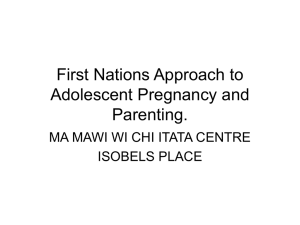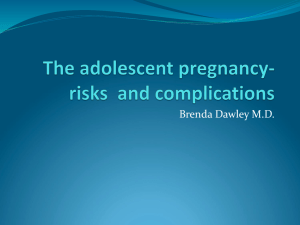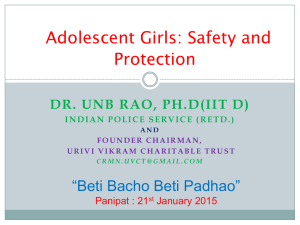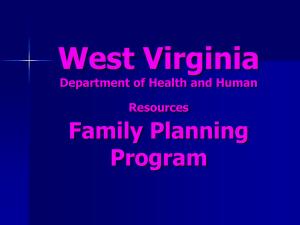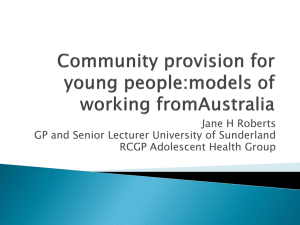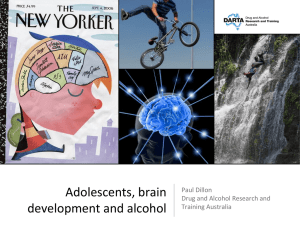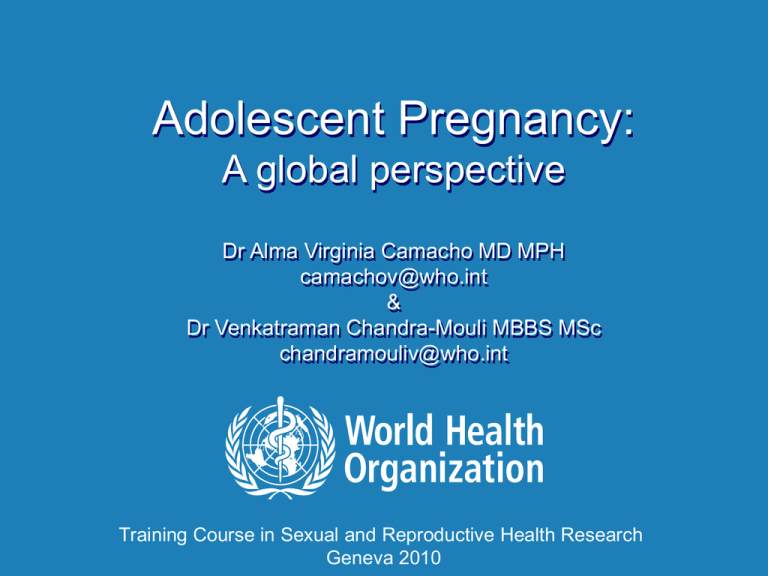
Adolescent Pregnancy:
A global perspective
Dr Alma Virginia Camacho MD MPH
camachov@who.int
&
Dr Venkatraman Chandra-Mouli MBBS MSc
chandramouliv@who.int
Training Course in Sexual and Reproductive Health Research
Geneva 2010
1. What is the magnitude of adolescent
pregnancy ?
2. What are the consequences of
adolescent pregnancy ?
3. What are the circumstances in which
adolescent pregnancy occurs ?
4. What needs to be done to respond to
adolescent pregnancy ?
5. What is the relevance of adolescent
pregnancy to the Millennium
Development Goals ?
Adolescent
pregnancy
About 16 million girls aged 15-19 years give
birth annually. 90% of them are in
developing countries.
The characteristics of
young mothers are
common across the
regions of the world:
-Little education,
-Rural dwelling,
-Low income.
Source: Growing up global: The Changing
Transitions to Adulthood in Developing
Countries (National Research Council, 2005).
More than 1/5 of women in the poorest
regions have a child by age 18.
35
30
25
20
15
10
5
0
West Asia
& North
Af rica
South
America
Carribean
& Central
America
South,
Central &
South
East Asia
Eastern & Western &
Southern
Middle
Af rica
Af rica
Source: Tabulations of demographic & health surveys from 51 countries,1990-2001. (National Research
Council, Growing up global: The Changing Transitions to Adulthood in Developing Countries, 2005).
1. What is the magnitude of adolescent
pregnancy ?
2. What are the consequences of
adolescent pregnancy ?
3. What are the circumstances in which
adolescent pregnancy occurs ?
4. What needs to be done to respond to
adolescent pregnancy ?
5. What is the relevance of adolescent
pregnancy to the Millennium
Development Goals ?
Adolescent
pregnancy
Greater likelihood of maternal mortality
1400
1200
1000
800
20-34 years
15-19 years
600
400
200
•
0
The risk of dying from
pregnancy-related causes is
twice as high for adolescents
aged 15-19, as for older
women.
Ethiopia
B'desh
Brazil
Source: Safe Motherhood Initiative Factsheet, 1998.
Adolescent Sexuality & Childbearing.
Clinical causes of maternal mortality
among adolescents – 1/3
• Unsafe abortion1
– Study from a teaching hospital in Nigeria (over a
10 year period) – abortion was the cause of
36.9% of maternal deaths in 10-19 year olds
• Obstructed labour2
– Strong indications of higher risk in mothers below16
years since pelvis is still not fully developed
08_XXX_MM7
• Many studies use caesarean section incidence as a proxy
for obstructed labour – many studies in Africa and one in
India found a greater likelihood of this in adolescents than in
adults
Sources: 1.Ujah, 2005; 2. WHO, 2004
Clinical causes of maternal mortality
among adolescents – 2/3
• Hypertensive disorders
– Two studies – one in Turkey1 and one in
Mozambique2 – found an increased incidence of
hypertensive orders in adolescent mothers, when
compared to non-adolescent mothers. However,
other studies3 have shown no difference
08_XXX_MM8
• But they did not standardize for parity
Sources: 1. Bozkaya et al, 1996; 2. Granja et al, 2001; 3. Ministerio de Salud, El Salvador, 2007
Clinical causes of maternal mortality
among adolescents – 3/3
• Injuries – suicide and homicide
08_XXX_MM9
Deaths per 1000 women-years
– In a study in Bangladesh, violence-related injuries were
highest among pregnant adolescents1
10
9
8
7
6
Pregnant
Not pregnant
5
4
3
2
1
0
15-19
20-24
25-29
30-34
35-44
Sources: 1. Ronsmans et al, 1999
Maternal morbidities in
adolescents – 1/2
• Anemia
– Large, high quality study in Latin American &
Caribbean found that mothers below16 years old had
a 40% increased risk of anemia, compared to
mothers age 20-241
08_XXX_MM10
• There were no significant differences for older
adolescents
Sources: 1. Conde-Agudelo, Belizán & Lammers, 2005
Maternal morbidities in
adolescents – 1/2
• Malaria
– In a recent study in Mozambique, malaria was the cause of
death in twice as many adolescent mothers (26.9%) as nonadolescent mothers (11.7%)1
08_XXX_MM11
• Obstructed labour – fistulae
– Studies in Africa have shown that 58-80% of women with
obstetric fistulae are under age 20, with the youngest aged only
12 or 13 years2
– 59% and 27% of fistulae cases occurred in women below 15 &
18 years respectively3
Sources: 1. Granja et al, 2001; 2. Ministry of Health, Kenya, and UNFPA, 2004; 3. Ampofo, 1990
Babies born to adolescent mothers
face higher risks
• Adolescents are at an increased risk for pre-term
labour & delivery, compared to older women.
• Babies born to adolescent mothers are more likely
to be of low birth weight.
• Babies born to adolescent mothers are at an
increased risk of perinatal & infant mortality.
Source: Adolescent pregnancy – Issues in adolescent health and development. Geneva. WHO 2004.
Relationship between maternal age
and perinatal outcomes
08_XXX_MM13
• Rigorous study in Latin American & the Caribbean
showed that:
– Adolescent mothers had higher risks of regular &
very preterm delivery, & of giving birth to infants
that were low & very low birth weight, as well as
small for gestational age (compared to women
aged 20-34)
– Infants born to women below 16 years faced a
50% increase in risk of early neonatal death
– All risks increased as maternal age decreased
Source: Conde-Agudelo, Belizán & Lammers, 2005
Potential risks to the adolescent
mother's life prospects
•Pregnancy can bring status for a married adolescent in cultures
where motherhood is the core aspect of a woman's identity.
• On the other hand, an
unmarried pregnant
adolescent may be
driven away by her
family, or abandoned by
her partner & be left with
no means of support.
Socio-economic deprivation:
both a cause & consequence of adolescent pregnancy
Too early
pregnancy
Poverty
Loss of
educational
&
employment
opportunities
" We young women are not prepared to
become mothers. I would like to continue my
studies. But since I have had my daughter, my
options have changed because I have many
more obligations now. I hope that this will not
be a barrier for me to succeed in life."
Eylin 19, Honduras January 2006.
Source: World Development Report 2006 (World Bank, 2006.)
1. What is the magnitude of adolescent
pregnancy ?
2. What are the consequences of
adolescent pregnancy ?
3. What are the circumstances in which
adolescent pregnancy occurs ?
4. What needs to be done to respond to
adolescent pregnancy ?
5. What is the relevance of adolescent
pregnancy to the Millennium
Development Goals ?
Adolescent
pregnancy
1. First sexual activity
occurs between 15-19 for
the majority of
adolescents; it is not
occurring earlier than in
the past. For many girls it
occurs in the context of
coercion & violence.
2. Over 1/3rd of adolescents
girls marry (or are
"married off") before 18.
Source: WHO. Women & Health. Today's evidence, tomorrow's agenda.2009.
Circumstances in which
adolescent pregnancy occurs.
Sex within
marriage
Intended
pregnancy
Adolescent
Pregnancy.
Unintended
pregnancy
Circumstances in which
adolescent pregnancy occurs.
Sex within
marriage
Intended
pregnancy
Sex outside a
recognised union
Adolescent
Pregnancy.
Unintended
pregnancy
Pregnancy within & before marriage:
Data from developing countries
Percent of First Births that Occur Within or Before Marriage
Western Asia/Northern Africa
South America
Caribbean/Central America
Former Soviet Asia
Within
Before
South-central/South-eastern Asia
Western/Middle Africa
Eastern/Southern Africa
TOTAL—All DHS
0%
20%
40%
60%
80%
100%
Source: National Research Council & Institute of Medicine, 2005
Circumstances in which
adolescent pregnancy occurs.
Sex within
marriage
Intended
pregnancy
Sex outside
marriage
Adolescent
Pregnancy
Consensual sex
- Within marriage
- Outside a recognised union
Unintended
pregnancy
Circumstances in which
adolescent pregnancy occurs.
Sex within
marriage
Intended
pregnancy
Sex outside a
recognised union
Adolescent
Pregnancy
Consensual sex
- Within marriage
- Outside a recognised union
Unintended
pregnancy
Non-consensual sex
io
pi
a
lc
ity
ro
vi
nc
e
B
ra
zi
lp
pr
Th
ov
ai
in
la
ce
nd
pr
ov
in
ce
N
am
ib
ia
ci
ty
B
an
S
gl
am
ad
oa
es
h
pr
ov
B
an
in
ce
gl
ad
U
es
.R
h
.T
ci
ty
an
za
ni
a
P
ci
U
e
ty
.R
ru
.T
pr
ov
an
in
za
ce
ni
a
P
ro
vi
nc
e
P
er
u
ci
ty
E
th
B
ra
zi
% of women reporting coerced first sex among sexually experienced women,
by site and by age at first sex
Levels of coerced sex &
its association with age of first sex
Coerced First Sex, by Age at First Sex
< 15 years
15-17 years
World Health Organization, 2005
18 + years
50.0%
45.0%
40.0%
35.0%
30.0%
25.0%
20.0%
15.0%
10.0%
5.0%
0.0%
1. What is the magnitude of adolescent
pregnancy ?
2. What are the consequences of
adolescent pregnancy ?
3. What are the circumstances in which
adolescent pregnancy occurs ?
4. What needs to be done to respond to
adolescent pregnancy ?
5. What is the relevance of adolescent
pregnancy to the Millennium
Development Goals ?
Adolescent
pregnancy
Choosing the right interventions.
Sex within
marriage
Sex outside a
recognised union
Intended
•Advocate
with families & communities
pregnancy
&
•Provide opportunities for studyAdolescent
& work
Pregnancy
Unintended
pregnancy
Choosing the right interventions.
Sex within
marriage
Intended
pregnancy
Sex outside a
recognised union
Consensual sex
- Within marriage
- Outside a recognised union
Adolescent
Pregnancy
Enhance capacity to make well
informed & judicious choices
Unintended
pregnancy
Schools
•Provide information &
education
•Promote individual
responsibility & protective
norms
•Provide health services &
products
Mass media
Civil Society (Community Organizations)
Health services
Work with young men within & outside the context of
marriage or other recognised union.
Useful reference. The RSDP/Pathfinder
Bangladesh Newlywed strategy: Results of an
assessment. Washington DC, PathfinderFocus on Young Adults. 1999.
Useful reference: Promoting healthy relationships &
HIV/AIDS. Prevention for young men: Positive
findings from an intervention study in Brazil.
Horizons Research Update, 2004.
Choosing the right interventions.
Sex within
marriage
Sex outside a
Recognised union
Intended
pregnancy
Adolescent
Pregnancy
Consensual sex:
- Within marriage
- Outside a recognised union
Unintended
Provide
a safety net &
pregnancy
a second chance.
Non-consensual sex
Provide a
safety net.
Making Emergency Contraceptive Pills (ECPs) widely
available & accessible.
Useful reference: Program for Appropriate Technology. Increasing youth access to
services. Directions in Global Health. 2004; 1 (1) 4-5.
Providing safe abortion services (where legal)
or
Providing effective post-abortion care.
Useful reference: Herrick J post abortion care programs for adolescents. FOCUS Youth
Adolescent Reproductive Health Briefs. No. 5, Washington DC, USA. Pathfinder
International. Focus on Youth Adults. 2002.
Preventing subsequent
pregnancies is key
Preventing second pregnancies by
supporting adolescent mothers.
Useful reference: McNeil P. Women's Centre of Jamaica
Foundation. Preventing second adolescent pregnancies by
supporting young mothers. Youth Adult Reproductive Health.
Project Highlights. Focus on Young Adults Directions in
Global Health. 1998.
Choosing the right interventions.
Sex within
marriage
Intended
pregnancy
Sex outside a
Recognised union
Adolescent
Pregnancy
Consensual sex:
- Within marriage
- Outside a recognised union
Unintended
pregnancy
Non-consensual sex
Break the silence against sexual
coercion & fight it vigorously.
Break the silence against sexual
coercion & fight it vigorously.
• Bring perpetrators to justice.
• Mobilize public opinion to be
intolerant of it.
• Protect girls/women from sexual
harassment & coercion in
educational institutions, work
places & in other community
settings.
•Empower them to protect
themselves, and to ask for & get
help when needed..
Policy maker
Creates an environment that supports the
health of pregnant women & new borns
Community
Advocates & facilitates preparedness &
readiness actions
Family
Support pregnant woman’s plans
during pregnancy, childbirth & the
postpartum period.
Woman
Prepares for birth, values & seeks skilled care
during pregnancy, childbirth & the postpartum period
Facility
is equipped, staffed & managed
to provide skilled care for
the pregnant woman & the new born
Provider
provides skilled care
for normal & complicated
pregnancies,
births & the postpartum period
Ensuring that young pregnant women get the health care &
social support they need
1. What is the magnitude of adolescent
pregnancy ?
2. What are the consequences of
adolescent pregnancy ?
3. What are the circumstances in which
adolescent pregnancy occurs ?
4. What needs to be done to respond to
adolescent pregnancy ?
5. What is the relevance of adolescent
pregnancy to the Millennium
Development Goals ?
Adolescent
pregnancy
The relevance of adolescent pregnancy to
the Millennium Development Goals (MDGs)
• Adolescent pregnancy
contributes to maternal
mortality
• Adolescent pregnancy
contributes to perinatal
and infant mortality
• Adolescent pregnancy
contributes to the vicious
cycle of poverty.
The relevance of adolescent pregnancy to
the Millennium Development Goals (MDGs)
• Adolescent pregnancy
contributes to maternal
mortality
• Adolescent pregnancy
contributes to perinatal
and infant mortality
• Adolescent pregnancy
contributes to the vicious
cycle of poverty.
Reducing maternal mortality in adolescents:
Actions needed at three levels.
• Prevention of too
early pregnancies –
within or outside
marriage.
• Prevention of unsafe
abortions, and
deaths due to
abortions.
• Prevention of deaths
during pregnancy
and child birth.
Reducing infant & maternal mortality in
adolescents: Actions needed at three levels.
• Prevention of too
early pregnancies –
within or outside
marriage.
• Prevention of unsafe
abortions, and
deaths due to
abortions.
• Prevention of deaths
during pregnancy
and child birth.
Contraceptive use in adolescents
Unmet Need for Contraception, by Age Group
Sub-Saharan Africa
South and Southeast Asia
15–24
25–34
35+
North Africa and West Asia
Latin America and the Caribbean
Central Asia
All Countries
0.0
5.0
10.0
15.0
20.0
25.0
% of married women with unmet need
Source: Demographic & Health Surveys,2008
30.0
Use of maternal health care by
adolescents – 1/2
• Use of antenatal care (ANC)
– A systematic review of maternal health care use
• Women under 20 years are less likely to receive ANC during
the first trimester (high quality studies from Jamaica, Brazil,
South Africa, India/Kerala, Ecuador)1
– In the Philippines, only 29% of mothers below18 received ANC,
compared to 81% of mothers aged 20-302
08_XXX_MM41
• Use of facility-based delivery
– Significant age differences in favour of older women (high quality
studies from India, Morocco, Guatemala)1
Source: 1. Say L, 2007 (unpublished data); 2. Dela Cruz, 1996
Use of maternal health care by
adolescents – 2/2
08_XXX_MM42
• Use of skilled delivery assistance
– No age-difference appears to exist (high quality studies from
Bangladesh, India, Nepal)1
• Higher education (both woman’s and her partner’s),
problems during delivery, living standards, and women’s
autonomy are more significant in influencing the receipt
of assistance from a skilled health worker during delivery
– In an older review, mothers below the age of 19 were
significantly less likely than mothers aged 19-23 to receive
skilled childbirth care in 7 of 15 countries2
Source: 1. Say L, 2007 (unpublished data); 2. Family Health International, 2003
Within a multifaceted approach, we need to
ensure that every adolescent is able to obtain the
health information & services she needs.
– We need to ensure that
contraceptive services,
antenatal services and skilled
care at delivery are widely
available.
– We need to ensure that these
services are accessible to
adolescents.
– We need to ensure that health
care providers who provide
these services are trained and
support to respond to
adolescents competently & with
sensitivity.
" For too long, when an
adolescent becomes
pregnant, we have pointed
the finger at her. It is time
that we pointed the finger
at ourselves. If a girl gets
pregnant that is because
we have not provided her
with the information,
education, training and
support she needs to
prevent herself becoming
pregnant."
Pramilla Senanayake,
Former assistance Director
International Planned Parenthood
Federation.
Assignment
Is adolescent pregnancy a
public health priority in your
country?
Please support your answer
with 3 facts.
Assignment Story:
• Please hear the story
WHO | Teenage pregnancies cause many health, social problems - Listen to this episode
– Based on the story, please respond to the
following:
• What are the three main factors that contributed to
this?
• What can be done by families and communities to
prevent this happening to other girls?
• What can the Ministry of Health do to reorient the
health care system to meet the needs of girls such
as the one who story you have heard?

